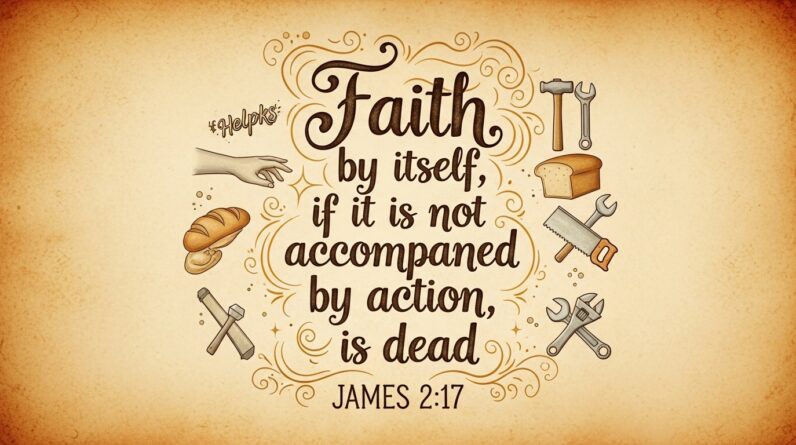Trusting God’s Plan: Applying Proverbs 3:5–6 To Major Life Choices
You face decisions every day, but some choices carry more weight than others — a career move, whom you marry, how you steward money. Those big decisions can make you anxious, indecisive, or overly self-reliant. In Scripture God invites you into a posture of trust. The invitation in Proverbs isn’t a vague suggestion; it’s a practical guide for life. In this article you’ll learn practical ways of applying Proverbs 3:5-6 when you stand at life’s crossroads so you can move forward with confidence, clarity, and peace.
To begin, read the core promise together: Proverbs 3:5-6. Let that passage sit with you as we walk through what it means to lean on God rather than leaning on your own understanding—especially when the stakes are high.
Why this matters to you
When you’re making major life choices you naturally look for certainty. You want to minimize risk, avoid regret, and maximize blessing. But your human understanding is limited. Proverbs tells you not to depend on that limited vantage point. Instead, you’re invited to trust God, submit your ways to Him, and let Him direct your path. This is not a call to passivity; it’s a call to an active trust that shapes how you think, pray, plan, and act.
You’ll find throughout this article that applying Proverbs 3:5-6 is both spiritual and practical. You’ll get steps you can use today for career, relationship, and financial decisions, along with spiritual disciplines that deepen your reliance on God as you follow His lead.
Understanding the passage
What Proverbs 3:5-6 actually says
The verse reads, “Trust in the Lord with all your heart and lean not on your own understanding; in all your ways submit to him, and he will make your paths straight.” See Proverbs 3:5-6. Those words carry theological weight and practical direction: whole-hearted trust, refusing to lean on limited human wisdom, submitting every part of your life to God’s authority, and receiving His guidance in return.
Proverbs is wisdom literature. Its goal is to teach you how to live skillfully under God’s rule. Practically speaking, this verse asks you to (1) trust God fully, (2) refuse to depend on merely your own reasoning, and (3) intentionally submit your decisions to the Lord. That combination opens the door for God to guide you in ways you could not foresee on your own.
Trust vs. self-reliance
Trusting God doesn’t mean you stop thinking or planning. It means you change the starting point for your decisions. Instead of beginning with, “What do I want? What seems safest?” you begin with, “What does God want? How can I honor Him?” When you let God lead, you release the weight of trying to control every outcome, and you invite His wisdom into your process. This is a radical freedom.
Contrast that with self-reliance. Self-reliance says: rely on your intellect, your experience, and your resources alone. The Bible recognizes the limits of that approach. Even brilliant human planning can go awry. See Proverbs 16:9, which reminds you that while humans may plan, the Lord directs the steps. So you plan, but you pray, and you stay responsive to His leading.
How to begin applying Proverbs 3:5-6
Start with surrender, not answers
The first step in applying Proverbs 3:5-6 is surrender. Surrender is an act of will: you choose to stop leaning on your own answers and to ask God for direction. Surrender doesn’t mean you give up responsibility for the decision—it means you give up the illusion that you can control everything.
Make a short prayer of surrender before you analyze options: “Lord, I submit this choice to You. I want Your will more than my comfort or my plan.” That posture opens your heart to God’s wisdom. It aligns your desires with His and prepares you to hear from Him.
Pray for wisdom and seek it practically
Ask for wisdom. James tells you that if you lack wisdom, you should ask God, who gives generously. See James 1:5. Asking isn’t passive; it’s intentional and repeated. Prayer is the way you connect your desire for guidance with God’s limitless wisdom.
Along with prayer, be practical: gather facts, consult trusted advisors, and weigh options. God often uses human means—scriptures, counselors, circumstances—to confirm His leading. The prayer and the practical work belong together. You ask God for insight and then do the homework to test the insights He gives.
Align decisions with God’s revealed will
God’s revealed will—His commands, values, and promises—provides a compass. If a choice contradicts clear biblical teaching, it’s not God’s will. Evaluate options through Scripture: Will this honor God? Will it conform to biblical values like love, justice, humility, and stewardship? See Romans 12:2 about setting your mind according to God’s will.
When you align your options with Scripture, you create a narrow corridor in which God’s guidance becomes easier to perceive. The Bible isn’t a magic step-by-step decision-maker, but it shapes the categories and values that filter your choices.
Applying to career decisions
Know your calling and gifts
When you’re thinking about jobs, promotions, or vocational changes, begin with the question of calling. God gifts you uniquely. Successful long-term work often comes when your gifts meet real needs in the world. Reflect on your talents, passions, and fruit. Ask others to speak into areas where they see your strengths.
Use prayerful discernment and vocational testing where appropriate, but remember: calling is more about obedience to God’s opportunities than just maximizing comfort or income. Seek God’s will, ask for wisdom (see James 1:5), and evaluate how options line up with your gifts and God’s kingdom purposes.
Make choices with a long view
Career choices are rarely just about today. Consider where a decision will lead in five or ten years. Will this position help you grow spiritually, relationally, and professionally? Will it position you to serve others and bear fruit for God’s Kingdom?
Balance ambition with humility. You can want success and God can bless your efforts, but let your ultimate aim be faithfulness, not fame or security alone. Remember Jeremiah 29:11—God has plans to prosper you and give you hope—but that promise is often shaped through faithful obedience, not shortcuts.
Evaluate culture, ethics, and mentorship
A workplace culture affects your spiritual life. Will the role require compromising your beliefs? Will it pull you away from your church family or your spiritual practices? Also, look for mentors and colleagues who will sharpen you. God often uses other believers to confirm and direct your path.
When you make decisions in this way, you’re applying Proverbs 3:5-6 in real life: you’re not leaning solely on your own understanding of success but submitting your career path to God’s guidance.

Applying to relationship decisions
Relationships shape your destiny
Marriages, friendships, and close partnerships deeply influence who you become. When you choose a life partner or enter a major relational commitment, you’re shaping the soil in which your faith will grow. Therefore, approach relationship decisions with reverence and thoughtfulness.
Practical questions to ask: Does this person love God and pursue spiritual growth? Do they respect and honor you? Are your core values compatible? How do you handle conflict together? Scripture instructs you to be equally yoked in faith matters, and wise counsel is crucial.
Use boundaries, tests, and time to discern
Give relationships time and testing. Healthy boundaries preserve your freedom to discern God’s will clearly. Don’t rush because of pressure, loneliness, or cultural expectations. Time reveals character and allows the Holy Spirit to confirm or redirect.
Talk openly about major life issues—kids, finances, church involvement, family dynamics, career goals—before you commit. The clarity you gain helps you make a decision that honors God and protects both of you from avoidable conflict.
Seek godly counsel
God often speaks through mature believers. Consult pastors, mentors, and trusted friends who know you and will pray with you. They can help you see blind spots and bring biblical wisdom into your evaluation. Remember, Proverbs encourages you to listen to wise counsel. See Proverbs 15:22 which says that plans fail without counsel. Receive correction humbly and weigh it prayerfully.
When you apply Proverbs 3:5-6 to relationships, you practice trusting God, not your immediate feelings or pressures, and you invite His wisdom into one of life’s most consequential decisions.
Applying to financial decisions
Stewardship is a spiritual practice
Money isn’t neutral. How you earn, spend, save, and give reveals your heart. When you face major financial decisions—investments, purchases, debts—frame them as stewardship choices. Ask: Will this glorify God? Will this free me to serve others? Will this reflect wise management?
The Bible gives principles, not spreadsheets. Save prudently, avoid unnecessary debt, give generously, and seek counsel for complex choices. Matthew 6:33 teaches you to seek God’s kingdom first; that priority shapes financial decisions.
Make financial plans and prayerful budgets
Budgeting is not legalism; it’s a tool for freedom. A plan helps you say yes to God’s purposes and no to the idols of consumption. Build margin into your finances for generosity and unexpected needs. When you pray about financial choices, don’t expect a supernatural sign every time; often God guides through principles like generosity, prudence, and wisdom from experts.
If you lack financial understanding, ask and learn. See James 1:5 again: God gives wisdom to those who ask. Combine that wisdom with professional advice when necessary.
Risk, faith, and prudence
Sometimes God calls you to risk for a kingdom opportunity—a move across the world, a start-up ministry, a major giving decision. Risk isn’t reckless when it’s prayerful, informed, and humble. Evaluate risks, prepare contingency plans, and be willing to step out when God confirms the call.
At the same time, avoid a false expectation that every risky leap is spiritual. Test the call through Scripture, counsel, and a sense of peace from God. You’re applying Proverbs 3:5-6 when you trust God but also make wise preparations.
A practical decision-making process (step-by-step)
Step 1: Pray for clarity and surrender control
Begin by surrendering the decision to God. Ask for clarity, wisdom, and peace. Say out loud: “Lord, I submit this decision to You. I want Your direction more than my comfort.”
This first step sets the tone. You’re not handing the decision to a magic formula, but you are aligning your heart with God’s purposes.
Step 2: Gather facts and list options
Be thorough. Write down the choices, pros and cons, consequences, costs, and timelines. The Gospel doesn’t forbid using your head. Accurate information helps your heart discern what aligns with God’s will.
Step 3: Test against Scripture and values
Evaluate each option against biblical standards. Will this choice help you love God and love others? Will it honor the fruit of the Spirit? See Romans 12:2 for guidance on renewing your mind by God’s truth.
Step 4: Seek godly counsel
Talk to mature believers who can speak truth into your life. Listen for patterns: if several people with spiritual maturity and knowledge of your situation point in one direction, that’s a weighty consideration.
Step 5: Wait for peace and confirmation
Listen to your heart and spirit, and look for confirmation in circumstances. Peace from God is often a key indicator. See Philippians 4:6-7, which promises God’s peace when you bring your requests to Him.
Waiting is hard, but allowing space to wait often reveals God’s timing and reduces regret.
Step 6: Move forward and steward the result
When you decide, move forward with confidence if you sense God’s leading. Steward the outcome—whether it’s the best or requires correction. God often uses imperfect choices to teach and refine you. If you make a mistake, repent, adjust, and continue.
This process is a concrete way of applying Proverbs 3:5-6: you trust, you don’t lean only on your understanding, you submit your ways, and you let God direct your path.
Dealing with fear, doubt, and second-guessing
Fear is normal; don’t let it control you
Fear is a signal, not a verdict. It alerts you to risk and invites prayer, not paralysis. When fear arises, bring it to God. Cast your anxieties on Him and ask for His peace. See 1 Peter 5:7, which encourages you to cast your anxieties on God because He cares.
Reframe fear into faithful caution: prepare where necessary, but don’t let fear be the final authority.
Doubt can be an invitation to deeper faith
Doubt often pushes you to seek certainty in God rather than in circumstances. When doubts come, use them to refine your understanding—pray, re-evaluate, seek counsel, and rest in God’s promises. Remember that Biblical faith often grows through testing (see James 1:2-4).
Avoid paralysis by analysis
You can overanalyze forever. At some point you must decide. Use the decision-making steps above, set a reasonable deadline, and move forward. Trust that God will be with you even if the path changes. God’s faithfulness doesn’t vanish because you made an imperfect choice.
When God says “wait”
Waiting can be active preparation
Sometimes God’s answer is “not yet.” Waiting can feel frustrating, but it’s often a season of preparation. Use waiting to grow spiritually, gain skills, build relationships, and clarify motives.
Psalm 37:5 encourages you to commit your way to the Lord and to trust Him; sometimes that commitment includes patient waiting. See Psalm 37:5.
Watch for signs of closure or opening
During waiting seasons, watch for God’s nudges. Doors may close, or new opportunities may open. Stay attentive and flexible. God’s timing is often as important as His direction.
Common pitfalls to avoid
Relying solely on feelings
Feelings are informative but not infallible. They can be influenced by stress, hormones, or temporary circumstances. Ground decisions in prayer, Scripture, and counsel, not just emotion.
Looking for a miraculous sign for everything
You won’t always get an audible voice or a dramatic sign. God commonly speaks through Scripture, counsel, circumstances, and inner peace. Expect ordinary means of guidance and be ready to act.
Confusing desire with calling
Not every intense desire is God’s call. Test desires against God’s character, community confirmation, and Scripture. Desire can become holy when aligned with God’s will.
Living out the results
Obedience matters more than success
You can trust God and still face hardship. Obedience to God’s leading is itself a form of success because it cultivates your character and aligns you with His purposes. Jesus said that abiding in His word bears fruit; faithfulness in small things prepares you for larger tasks.
Even when outcomes are hard, God can redeem them for your growth and for the good of others. Trusting God through the outcome is as important as trusting Him in the decision.
Reassess and pivot when needed
If the outcome reveals misalignment or failure, don’t despair. God allows second chances and grace-filled course corrections. Evaluate what went wrong, learn, and pivot. Your future is not defined by a single choice but by a lifestyle of trust and repentance.
Examples from Scripture and life
Biblical examples
Abraham left his home by faith because God called him to a new land (see Genesis 12:1-4). Joseph made choices of integrity in Egypt and trusted God through suffering (see Genesis 39-50). Both illustrate trust that navigates uncertainty and is later affirmed by God’s providence.
Through their stories, you see that God’s guidance often unfolds over time and through circumstances. That pattern should encourage you when you feel your path isn’t yet clear.
Real-life example
Consider someone who felt called to leave a stable job to plant a church. They prayed, consulted leaders, studied finances, and learned skills. It wasn’t immediate success—there were hardships—but over time, fruitfulness came. That person was applying Proverbs 3:5-6 by trusting God’s direction, not just their comfort, and by submitting their plans to God in prayer and counsel.
Your story may not look the same, but the principles apply: seek God, prepare practically, and remain responsive.

A sample prayer for major decisions
Use this prayer as a template when you’re facing a big choice:
“Lord, I thank You that You know the end from the beginning. I submit this decision to You. Give me wisdom, clarity, and peace. Help me not to lean on my own understanding but to trust You with all my heart. Send godly counsel, confirm by Your Word, and give me the courage to follow where You lead. I want Your will more than my comfort or plans. In Jesus’ name, Amen.”
Pray this honestly and often. Let prayer shape not only your decision but your heart.
Closing encouragement
You will make choices that matter. Each time you practice submitting your ways to God, your trust grows. Apply the steps you’ve read here and remember: you’re not alone. God promises to guide you when you trust Him with all your heart. See again Proverbs 3:5-6. When you follow Him, He will make your paths straight in ways that honor you, grow you, and serve His purposes.
You’ve learned a practical road map: surrender, seek wisdom, evaluate against Scripture, consult counsel, wait for peace, decide, and steward the result. Whether it’s a career shift, a relationship commitment, or a financial crossroads, you can move forward with the confidence that comes from applying Proverbs 3:5-6.
If you want a short checklist to carry with you:
- Pray and surrender the decision.
- Gather facts and evaluate options.
- Test options against Scripture.
- Seek wise counsel.
- Act with peace and stewardship.
Explore More
For further reading and encouragement, check out these posts:
👉 7 Bible Verses About Faith in Hard Times
👉 Job’s Faith: What We Can Learn From His Trials
👉 How To Trust God When Everything Falls Apart
👉 Why God Allows Suffering – A Biblical Perspective
👉 Faith Over Fear: How To Stand Strong In Uncertain Seasons
👉 How To Encourage Someone Struggling With Their Faith
👉 5 Prayers for Strength When You’re Feeling Weak

📘 Jesus and the Woman Caught in Adultery – Grace and Mercy Over Judgement
A powerful retelling of John 8:1-11. This book brings to life the depth of forgiveness, mercy, and God’s unwavering love.
👉 Check it now on Amazon
As a ClickBank Affiliate, I earn from qualifying purchases.
Acknowledgment: All Bible verses referenced in this article were accessed via Bible Gateway (or Bible Hub).
“Want to explore more? Check out our latest post on Why Jesus? and discover the life-changing truth of the Gospel!”








